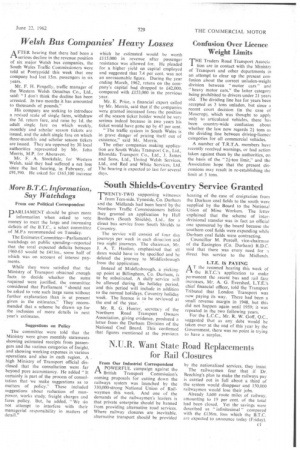South Shields-Coventry Service Granted
Page 31

If you've noticed an error in this article please click here to report it so we can fix it.
TWENTY-TWO supporting witnesses ;rom Tees-side, Tyneside, Co. Durham and the Midlands had been heard by the Northern Traffic Commissioners befOre they granted an application by Hall Brothers (South Shields), Ltd., for a direct bus service from South Shields to Coventry.
The service will consist of four day journeys per week in each direction and two night journeys, The chairman, Mr. I. A, T. Hanlon, emphasized that all dates would have to be specified and he deleted the journey to M iddlesbrough from the application.
Instead of Middlesbrough, a pickingup point at Billingham, Co. Durham, is to be substituted, A daily service will be allowed during the holiday period, and this period will include in addition to the normal holidays, Coventry holiday week. The licence is to be reviewed at the end of the year. '
Mr. R. G. Hunter, secretary of the Northern Road Transport Owners Association, giving evidence, produced a letter from the Durham Division of the National Coal Board. This confirmed that figures mentioned at the previous
hearing of the case of emigration from the Durham coal fields to the south were supplied by the Board to the National Union of Mine Workers. The letter explained that the scheme of interdivisional transfer was in fact an official one sponsored by the board because the southern coal fields were expanding while Durham coal fields were contracting.
Councillor M. Purcell, vice-chairman of the Easington (Co. Durham) R.D.C. said that there was every need for a direct bus service to the Midlands.
L.T.E. IS PAYING
AT the resumed hearing this week of the B.T.C.'s application to make permanent the recent bus and rail fare increases, Mr. A. G. Evershed, L.T.E.'s chief financial officer, told the Transport Tribunal that London Transport was now paying its way. There had been a small revenue margin in 1948, but this did not happen again until 1959; it was repeated in the two following years.
For the L.C.C., Mr. R. W. Goff, Q.C., suggested that as any debt would be taken over at the end of this year by the Government. there was no point in trying to have a surplus.












































































































